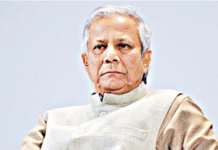
Passing the order after hearing both the defence and prosecution lawyers, Justice Obaidul Hassan, chairman of the three-member tribunal, also asked the jail authorities to provide treatment as and when the accused feels necessary.
A day before, Qaiser, a turncoat politician, filed the bail petition when police in compliance with the tribunal’s order produced him before it following his arrest.
Defence counsel SM Shahjahan prayed bail for his septuagenarian client on humanitarian ground as the accused has been suffering from geriatric complications.
Referring to his client’s physical condition, the counsel said the accused now moves on a wheel chair.
“I can assure the tribunal that if the accused gets bail, he will not flee and will appear before it following its order during the trial process,” said counsel Shahjahan.
Interrupting the defence counsel, the tribunal asked him what prompted the accused to get admitted at the Apollo Hospitals hours after the tribunal issued warrant of arrest against him on May 15 in connection with the war crimes case. But counsel Shahjahan apparently failed to give a convincing reply to the tribunal.
Hearing the reply from the defence counsel, the tribunal said: “It seems fishy the way the accused hastily rushed to the hospital for getting admission immediately after the tribunal’s order was aired on TV channels.”
Opposing the bail plea, designated prosecutor Rana Dasgupta told the tribunal that prima facie it shows accused Qaiser’s involvement in war crimes and the charges are grave in nature. Mere old-age complications can’t be a genuine ground for granting bail, he said.
Referring to the ground reality, Rana Dasgupta told the tribunal that a number of witnesses against Qaiser already filed General Diaries (GDs) with local police station alleging that the accused, an influential person in Habiganj, issued threats to them. One witness was killed in the meantime, he said.
The prosecutor said if the accused is enlarged on bail, the prosecution will be seriously prejudiced over the ongoing investigation process.
Referring to the ICT Act, he said there is no provision of bail under the International Crimes (Tribunals) Act 1973.
According to the investigation agency, Qaiser entered politics by joining BNP and subsequently became the president of Habiganj BNP. Later, he quit BNP to join Ershad’s Jatiya Party and became a state minister.
Accused Qaiser, as a local Peace Committee leader, had formed a vigilante group during the Liberation War after his name “Qaiser Force” comprising 500-700 of his trusted men in Habiganj and committed crimes against humanity, including genocide in collaboration with the Pakistani occupation army.
At the latter part of the Liberation War, he fled to London and returned to the country after 1975.









